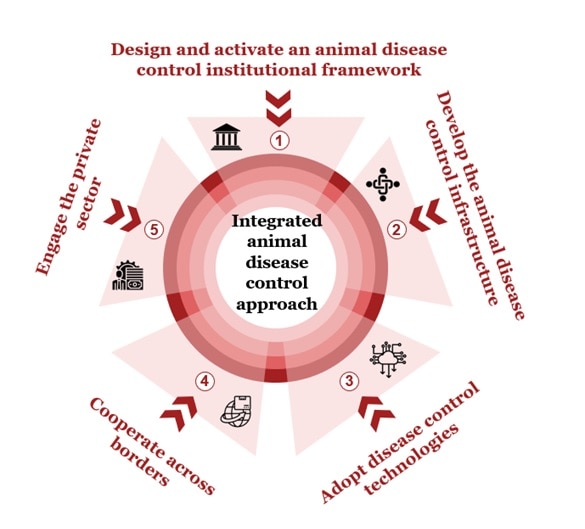
The COVID-19 pandemic has highlighted the seriousness of zoonotic diseases, those passed from animals to humans, and GCC countries are no strangers to such outbreaks. In 2019, about 17% of reported global zoonotic disease outbreaks occurred in the GCC region, despite being home to only 0.6% of the global livestock population . All were far less serious than COVID-19, but that is little solace. To improve, ministries of agriculture in the region need to act in an integrated and centralized manner.
Zoonotic diseases are a growing problem, accounting for about 60% of human infectious diseases, 2.5 billion cases of illness, and 2.7 million deaths each year—even before the COVID-19 pandemic. In addition to the impact on humans, commerce, travel, and the wider economy, these diseases poses a substantial threat to food security, reducing global annual animal production by about 20% according to estimates. Urbanization, global warming, and other trends will likely increase the number and impact of zoonotic diseases. The problem is significant in the GCC because of its legacy of herding and the need to sacrifice millions of livestock each year. Those conditions, combined with basic animal disease control systems and processes, create an environment that is conducive to future outbreaks.
Governments in the region can take a big step forward by creating an interdisciplinary and cross-sector approach to predict, detect, control, and combat zoonotic diseases. The approach requires five elements.

- 1. Design and activate an animal disease control institutional framework
- 2. Develop the animal disease control infrastructure
- 3. Adopt disease control technologies
- 4. Cooperate across borders
- 5. Engage the private sector
1. Design and activate an animal disease control institutional framework
The first element is to design an institutional framework and get it operating. Agriculture ministries need to establish a dedicated animal disease control (ADC) body, which can supervise and implement all animal health and welfare policies and oversee the response effort during outbreaks. The ADC body should be led by an autonomous chief veterinary officer. It should include consultative committees with other government entities, such as ministries of health, municipalities, and other authorities, to coordinate emergency plans and respond to outbreaks.
2. Develop the animal disease control infrastructure
The second element is for governments to build an integrated network of infrastructure, consisting of quarantine facilities, veterinary laboratories, and disease control centers (DCCs). Permanent DCCs should mirror national livestock herds and be responsible for monitoring and analyzing the national animal health situation, identifying and investigating potential threats, and raising the alarm in the event of outbreaks. When outbreaks occur, permanent DCCs should be supplemented by temporary DCCs in affected areas, along with rapid response teams to coordinate the immediate response.
3. Adopt disease control technologies
The third element is to use technology so that governments can become more proactive and develop effective, tailored responses. Today, only 0.01% of potential zoonoses have been researched and identified, which explains why most efforts are geared toward minimizing damage after a disease has broken out. Machine-learning algorithms and prediction software can anticipate the location of future outbreaks—and the people at the highest risk of being infected. Risk-based surveillance systems, disease detection drones, and animal traceability solutions can all help track emerging diseases. National health information databases can capture, store, and analyze animal disease-related data, identify trends, raise alerts, and simulate disease outbreak events. Governments can develop more effective responses if they have all this information available.
4. Cooperate across borders
The fourth element is to develop and deploy disease control plans to coordinate and unify efforts internationally among GCC countries and beyond. Such cooperation is necessary as diseases do not respect national borders. Regional collaboration will enable the detection of outbreaks earlier and make the most efficient use of available resources.
5. Engage the private sector
The fifth element is for governments to engage the private sector and take advantage of its expertise and resources. During the COVID-19 outbreak, multinational companies repurposed some of their facilities to produce vital goods to respond to the pandemic. Cooperation with the private sector efforts can be effective in terms of preventing or containing zoonotic disease outbreaks. For example, U.S. government cooperation with biotechnology equipment and reagent suppliers helped to stem a zoonotic disease outbreak that started in California in 2002 within 11 months of initial detection, compared to initial projections of 3 years.
GCC governments need an integrated approach to anticipate and head off future zoonotic pandemics. In this way, GCC governments can become more effective at animal disease control and can mitigate any risk of another pandemic.
This article originally appeared in Gulf Business, May 2020.
Contact us
















Menu